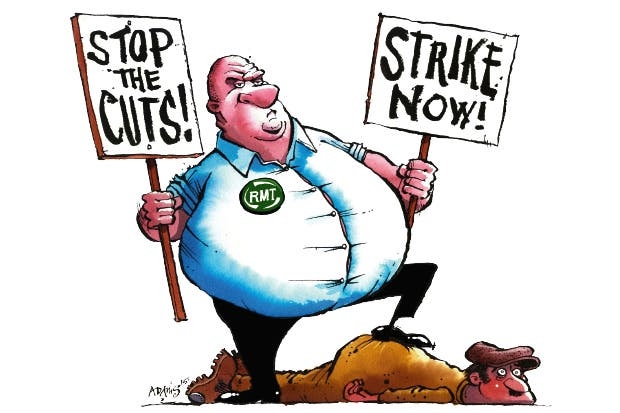I’m not a member of a trade union, but I should be. As a freelance journalist, my employment situation is precarious — yet it still wouldn’t occur to me to join the National Union of Journalists. My reasons are both personal and political, but mostly practical: the NUJ talks tough but, in the end, seldom achieves more than a few quid extra in your redundancy package.
Still, the union movement seems bent on wooing me; at least that’s how I’m interpreting Gerard Coyne’s campaign to oust Len McCluskey as Unite’s general secretary. Coyne’s manifesto touches on expected areas — better value for membership dues; a Brexit focus on training and skills — but it is in the main a prosecution of McCluskey’s leadership.
‘Our current leader spends too much of his time and your money playing at Westminster politics,’ Coyne has said, before returning to his theme again and again. He insists — oh so innocently — that he has nothing against Jeremy Corbyn. Yet he knows the Labour leader has lost the Unite rank and file and that this can be hung around McCluskey’s neck like a millstone.
For Coyne, the prize is not only knocking off a big beast of the far-left but making his union fit for purpose. ‘The world of work is changing fast,’ he says. ‘We are seeing the rise of insecure, poorly paid employment and a technological revolution that is transforming every workplace. Unite needs to become much better at recruiting and organising in the modern economy.’ Campaign talk yes, but it’s welcome to all who believe in a 21st-century trade union movement.
Since the triumph of Thatcherism, trade unions have never quite worked out where they stand in modern Britain. They no longer call the shots. ‘Government by consent of the TUC’ is a memory so distant it now sounds implausible, even though some still try to micromanage Labour policy and candidate selection. Others favour the belligerent strategies of the past, which may secure short-term gains but do so at the expense of trade unionism’s public standing.
In fact, the real problem with trade unions is not that they are too radical; it’s that they are too conservative. McCluskey is only a progressive to someone looking through a rear-view mirror. Under his watch, Unite helped saddle the country with a Labour leader who looks set to hand the Tories a Blairesque landslide.
Given McCluskey’s institutional strength, Coyne is an underdog, but his promise is twofold: He would revitalise Unite and, by toppling a key Corbyn backer, could give Labour a fighting chance. His pitch is simple: If you want your union and your party back, Coyne’s your man.
These are dungeon-dark days for MPs and activists, but even worse for those who rely on Labour. Workers, especially in low- or semi-skilled jobs, have been abandoned by a party supposed to fight for them. The challenges of Brexit, (s)low growth, and automation will not be tackled by a centre-left government, and so it falls to trade unions to take up the task. That means everything from attracting more self-employed members to investing in legal and policy resources as the regulatory landscape shifts.
It also means addressing potential members on their own terms. Cries of ‘solidarity forever’ may be stirring, but a union only makes us strong if enough of us join it. Right now, unions invite individuals to become an anonymous part of a collective; instead they should present themselves as a service tailored to individuals that brings with it the clout of common interests.
Labour relations are in sore need of a new trade union imagination, a vision to take the movement’s principles ahead. There is innovation to be found if you look for it. Community, for example, is the kind of forward-thinking union Unite should aspire to be, if, admittedly, on a very different scale.
Yet more unfamiliar territory lies ahead. Theresa May says she wants to stand up for workers; unions can only hold her to those words if they engage with the Government. That doesn’t mean weakening the historic link to Labour; it simply acknowledges that having influence over industrial relations policy means widening the scope of who you engage with. The surest way to defeat anti-union legislation is to make sure it never makes it to the drawing board.
True, the Tories are sitting pretty in the polls right now, but they yearn to end their exile from much of the North and the Midlands. Do not underestimate the power of electoral vanity.
Such are the trials facing trade unionism in 2017. Many of us are open to joining a modern union, but have no interest in funding a one-man power base. We will soon learn which Unite wants to be.
Stephen Daisley is a columnist for the Scottish Daily Mail.







Comments